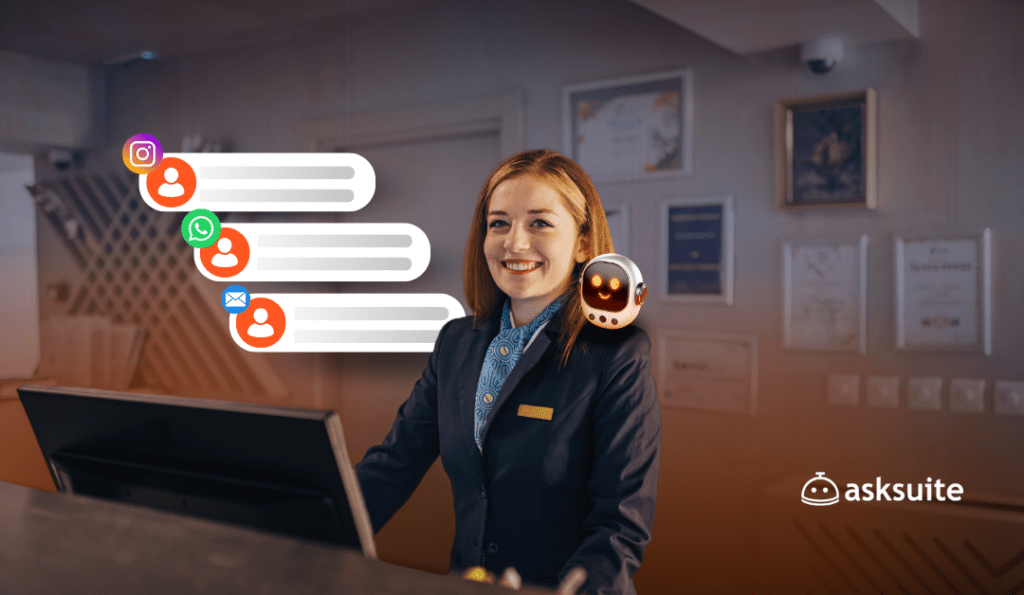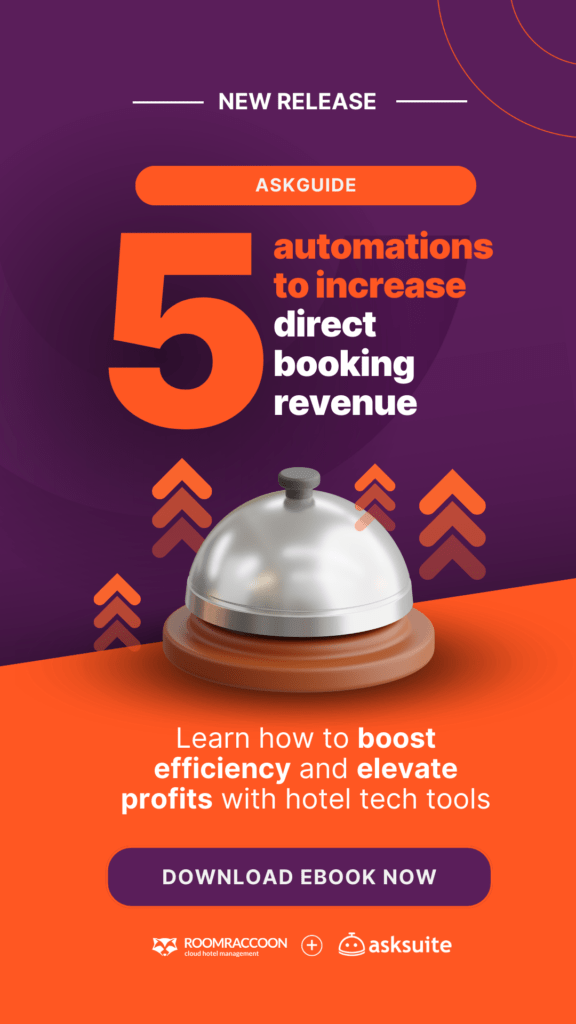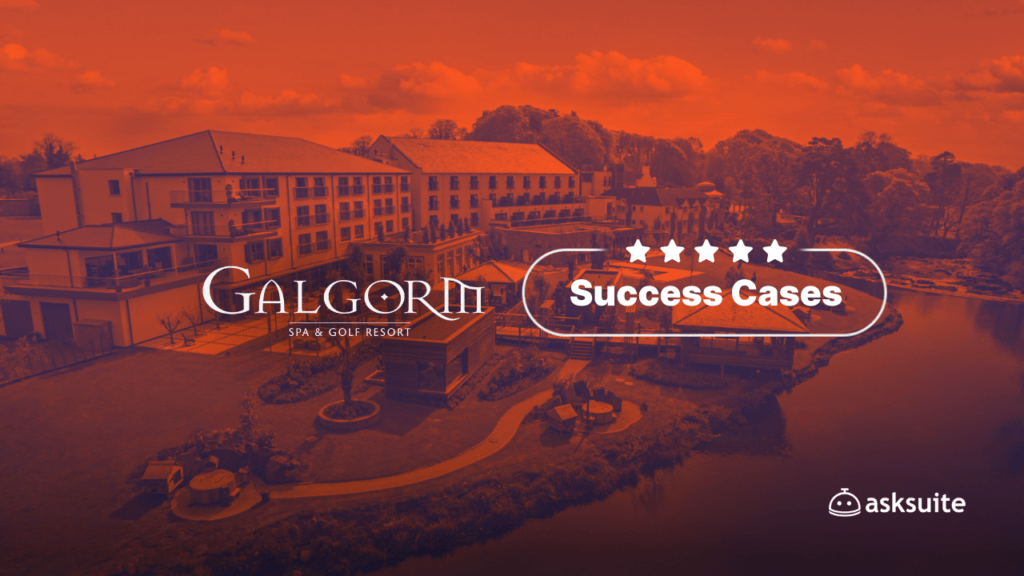Discover how AI for hotels can transform your revenue strategy by boosting direct bookings, enhancing guest experiences, and streamlining operations with powerful chatbots
The artificial intelligence (AI) market is experiencing remarkable growth: from 2023 to 2024 alone, there’s been a $50 billion increase in revenue. Experts predict that by 2030, this market will be valued at $826 billion. This rapid expansion shows how deeply integrated AI has become in our daily lives. So, here’s the big question for hoteliers: Is AI for hotels already present in your business to boost revenue and increase direct bookings?
The challenge for hoteliers, revenue managers, and marketing teams often lies in understanding how to practically implement AI in the hospitality industry and how to reap its benefits in terms of profitability and efficiency.
One of the standout uses of this technology in hotels is AI chatbots. Not only do they offer a transformative guest experience, but they also impact:
- Direct booking volume;
- Response times to travelers;
- Time spent on repetitive tasks;
- Revenue generated through AI.
Want to harness AI for your hotel and discover the best ways to use AI chatbots to elevate direct bookings? Keep reading!
How can AI chatbots be used in hotels?
AI isn’t the only growing demand worldwide. The hospitality industry is also showing its potential globally, with tourism & travel expected to contribute $11.11 trillion to the global economy in 2024—an additional $770 billion compared to 2023.
With this rising demand, your hotel must stay up-to-date with the best strategies and capitalize on the opportunity. It’s time to analyze if your hotel is prepared to:
- Provide 24/7 responses to travelers;
- Seamlessly guide potential guests to direct bookings;
- Instantly answer travelers in their language;
- Be present on travelers’ preferred channels.
If your answer is “no,” don’t worry. Tech tools are available to help, and implementing an AI chatbot for hospitality is the first step.
With the right AI-driven tools to support your staff, AI chatbots can make a significant difference. This tool is no longer just a buzzword—it’s a highly recommended solution for hotels looking to boost direct booking revenue.
By fully utilizing AI chatbots for hotels, you can:
- Free your staff from repetitive tasks like answering FAQs;
- Prevent travelers from abandoning bookings due to slow responses;
- Empower travelers to book independently;
- Reach travelers across all channels, including social media and your website.
To boost direct bookings and drive profits, it’s essential to ensure your hotel is available whenever and wherever travelers may be.
Let’s explore how your hotel can benefit from AI chatbots, taking revenue to a whole new level.
4 ways to increase direct bookings with AI chatbots for hotels
As mentioned earlier, the hospitality industry has its unique challenges. That’s why tailored tools, like AI chatbots specifically designed for hotels, are game-changers rather than generic solutions.
Elevating direct bookings (and therefore revenue) should be your hotel’s top priority. If this resonates with you, check out how to leverage AI to boost direct bookings:
1. Be available 24/7
One of the first noticeable changes when implementing a hospitality-driven chatbot is your hotel’s ability to respond to travelers around the clock. The best part? This doesn’t overload your staff—in fact, it frees up their time.
Asksuite is the global leader in AI booking agents and omnichannel communications for hotels. Our AI Reservation Agent can:
- Answer FAQs 24/7;
- Handle travelers’ multi-topic inquiries;
- Understand various languages;
- Be trained to provide accurate answers.
This way, you can prevent travelers from turning to OTAs for quick answers while increasing direct booking revenue.
Did you know? Asksuite is about to launch AskFlow, our newest product. With AskFlow, you can automate follow-up messages via WhatsApp to travelers who requested quotes but didn’t complete their bookings, offering another revenue stream with the help of AI chatbots.
2. Increase presence on all major channels
AI chatbots for hotels can seamlessly integrate with various communication channels, including email, social media and messaging apps. This allows your hotel to maintain consistent, personalized communication with potential guests across multiple platforms, increasing conversion rates.
That’s why it’s crucial to choose your AI chatbot wisely. Ensure the solution offers an omnichannel platform along with a chatbot, maximizing its effectiveness.
Using an omnichannel platform combined with a chatbot guarantees centralized messaging, regardless of the channel. This simplifies internal management by:
- Providing all human agents access to a full chat history;
- Eliminating the need to switch between multiple tabs;
- Allowing travelers to use different communication channels.
What’s more, you gain oversight of valuable data to measure your team’s performance, such as interaction volume, chatbot vs. human assistance, and 24/7 traveler inquiries.
3. Streamline the booking process
When a traveler is ready to book at your hotel, it’s crucial to make the process as easy as possible. For example, you can integrate Asksuite’s AI Reservation Agent with your channels to immediately guide potential guests through available room options and facilitate real-time reservations.
With this strategy, your hotel will:
- Receive direct bookings 24/7;
- Allow human agents to step in when needed;
- Speed up the decision-making process for travelers;
- Accelerate the sales funnel.
This experience contributes to higher conversion rates and more direct bookings.
Did you know? Asksuite has just released an exclusive ebook with five automations to increase direct bookings. Don’t miss out—get your free ebook now!
4. Turn guests into returning guests
Ultimately, all the previous strategies lead to this final point. High satisfaction naturally follows a well-structured process when travelers receive immediate responses, communicate on their preferred channels, and easily book their stay. This positive experience makes it more likely that they’ll be returning guests.
To take all this to the next level, AskFlow is a powerful tool. After their stay, you can automate review requests and offer vouchers for direct bookings, encouraging them to come back soon.
Amazing, right? With the right tech tools, your hotel’s direct bookings will surely soar.
What’s the best AI for hotels?
The best AI chatbot is the one that meets your hotel’s specific needs. Here are a few key factors to consider:
- Is it possible to integrate the chatbot with your hotel’s existing channels?
- Does it understand and respond in multiple languages?
- Is there an omnichannel platform integration?
- Can you train the chatbot with custom knowledge?
- Does the platform provide dashboards to measure performance?
As we’ve just learned, integrating AI reservation agents with the hotel industry offers more than just immediate benefits. By embracing a comprehensive AI strategy that includes advanced marketing techniques, data-driven decision-making, enhanced guest services, and continuous improvement through feedback, hotels can stay at the forefront of industry innovation.
With the ever-evolving hospitality landscape, the adaptability and efficiency offered by AI tech will undoubtedly play a pivotal role in shaping a successful and profitable future for hotels worldwide.
Be part of this revolution in the hospitality industry. Talk to one of our specialists and discover the leading AI Reservation Agent for hotels!






